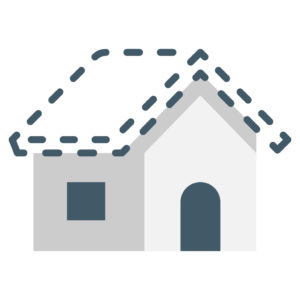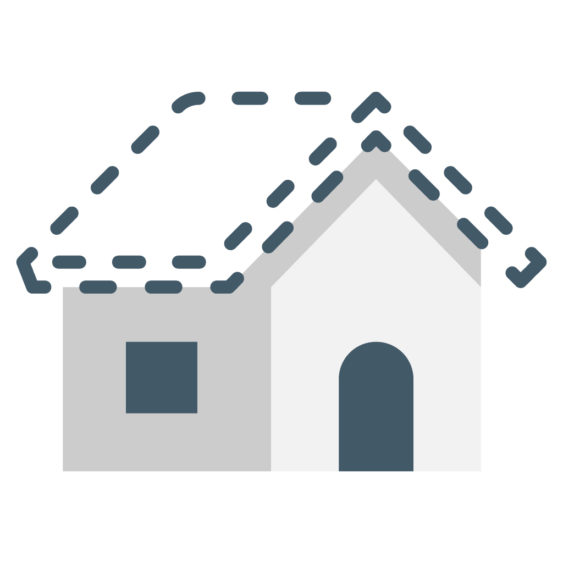Among the most common roof problems, the most predictable one is weather-related damage:
- Hail
- High winds
- UV rays
- Extreme heat
- Water erosion
Your roof is already at a disadvantage if it was improperly installed. It takes a trained eye to see big mistakes that will cost you in the future, but with a little observation, you can identify common roof problems that are plaguing you right now.

1. Blow Offs
What to look for:
Shingles and tiles are missing from the roof. You may or may not find the detached pieces. Sometimes, they are dislodged and not entirely separated, exposing the flashing. The holes left behind from uprooted nails offer entry points for water.
Causes:
High winds can rip shingles free, sending them flying off. Large hail may break tile roofing. If objects like tree branches fall on or roll off the roof, they can break or pull shingles and tiles away.
How to fix it:
Replace the missing shingles or tiles and repair any damaged flashing. This could be a small or large project depending on how much of the roof is affected.
2. Leaks
What to look for:
Another common roof problem is leaks. After heavy rain, you see wet spots in the attic. You may also hear or see water dripping. Stains appear on your sealing. Mold is showing up in corners and crevices.
Causes:
The flashing, eaves, tiles, or shingles could be damaged. Roof nails could be popped up. This roof problem is a gradual process that typically worsens over time. The exception to this rule is major structural damage caused by a falling object.
How to fix it:
The roof needs to be examined. Where the leak is and where the water is coming in may be different and will be determined by a roofing expert and repaired appropriately.
3. Poor Ventilation
What to look for:
When no leaks are present, you are still finding water damage spots, mold and mildew stains, bubbles or pockets forming under the surface of painted surfaces, and/or paint peeling. Shingles are curling, but your roof is in the beginning or middle of its typical life expectancy.
Causes:
Improper installation can seal a roof so well that it prevents ventilation. This encourages condensation to form with hot temperatures and high humidity. The moisture that forms causes water damage and destroys your home from the inside out.
How to fix it:
A new roof will be necessary when a roof has been improperly installed. This is why it is important to choose a trusted roofing company with many years of experience, like Roofing Recovery.
4. An Old Roof
What it looks like:
Shingles have begun to cup, curl, crack, become brittle, or lose their granules (go “bald”). Metal roofing paint is fading, damage may be present, and rust is forming. Tile roofing is cracked, broken, or missing.
Causes:
UV rays from the sun deteriorate the surface of your roof. When storms produce hail, they hammer away at the roof’s material, and loosening shingle granules, wear away metal roofing sealant, and damage tiles.
How to fix it:
A full roof replacement will be necessary. When damage is visible over more than half of your roof, it’s a clear sign that it is at the end of its life, and will not be able to perform well again with simple repairs.
5. Buckling Shingles
What it looks like:
Your shingles are lifting up in certain spots and forming arches. They are not laying flat on your roof, but are leaving gaps.
Causes:
Buckling shingles may be caused by inadequate ventilation or improperly installed shingles, such as layering them on top of one another. It’s acceptable to have 2 layers of asphalt shingles on your roof, but any more than that can lead to serious issues.
How to fix it:
The current roof will be completely removed and a new roof will be properly installed. The only cure is to start over and do it the right way.
6. Damaged flashing
What it looks like:
The metallic covering under your roofing material is partially missing, rusted or corroded. Flashing is galvanized metal that goes inside your roof penetrations. This is what repels and protects against water or moisture. Leaks may be present.
Causes:
Structural damage caused by flying debris or falling trees can damage the flashing. There is always a risk when high winds or large hail occurs during strong storms. Old flashing will be more prone to injury and improper installation can increase the chance of damage.
How to fix it:
Ask for a roof inspection to detect major roofing problems before they cause massive damage; prevention is your best defense. If leaks are already an issue in your home or business, make an appointment with a roof specialist right away to prevent costly water damage like rotting wood and mold growth.
If you have identified one or more of these common roof problems on your property in West Palm Beach, Broward, or Dade, Florida, contact the Roofing Recovery today!

